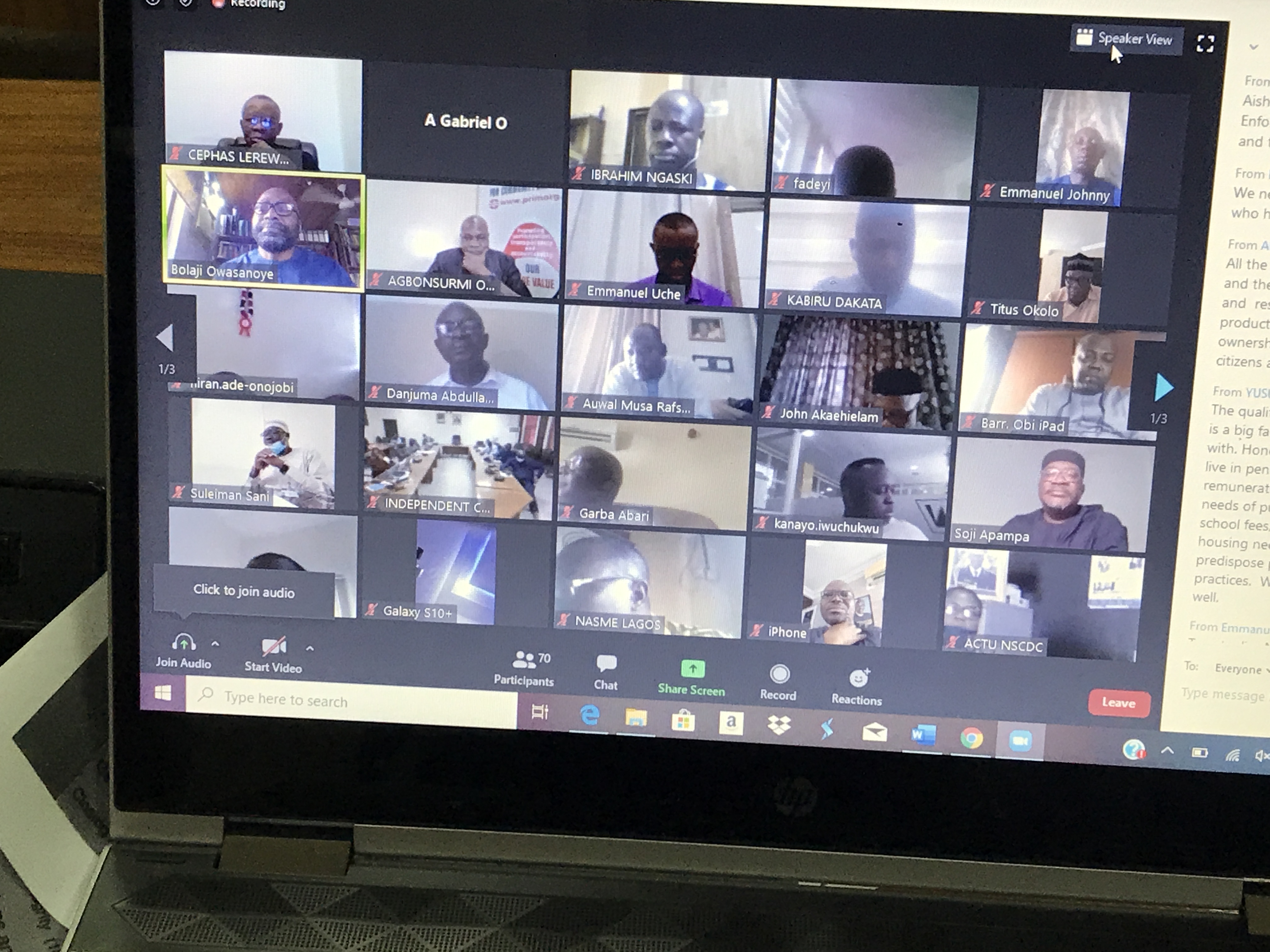With an overarching objective to halt the slide in Nigeria’s ethical values, the Independent Corrupt Practices and Other Related Offences Commission (ICPC), in collaboration with the National Orientation Agency (NOA) and the Office of the Secretary to the Government of the Federation (OSGF), has convened a meeting of stakeholders to consult with them on a draft National Ethics and Integrity Policy about to be presented to the Federal Government for adoption.
The meeting was held on a Zoom virtual platform and had in attendance representatives of major sections of the country’s public and private sectors including the media, professional bodies, chambers of commerce, religious associations, traditional rulers, MDAs, youth groups, civil society organisations, etc.
Welcoming participants to the meeting and setting its tone, ICPC Chairman, Prof. Bolaji Owasanoye, said it was convened to only discuss the “structure of the ethics and integrity policy”, noting that it was not a discussion on what collapsed Nigeria’s ethical values nor a discussion on what activities and sanctions would be applicable for violations of ethical standards. According to him, all those and more would be subjected to wide stakeholder consultations after the adoption of the framework bygovernment.
Prof. Owasanoye therefore urged them to feel free to make their inputs into the structures or pillars of the policy.
In his own opening remarks, the Director-General of NOA, Dr. Garba Abari, linked the nation’s ethics crisis with the negative effects of globalization, while advocating a critical brainstorming on how the contents of the policy would be taken to “every Nigerian in the most pedestrian manner that not only inspires them to own it, but to submit to its principles…”
The Permanent Secretary , Political and Economic Affairs Office, Mr. Andrew Adejo, who represented the Secretary to the Government of the Federation, Mr. Boss Mustapha, remarked that the policy was very important to government at this time given that previous attempts to institute national ethics policies had met with little success.
He noted that the policy was coming at an auspicious time as,going forward, because of the Covid-19 pandemic, a lot of business dealings would be virtual and would therefore rely heavily on partners’ integrity. Mr. Adejo also commended ICPC and its partners for the initiative and opined that if well implemented, the policy would drive down corruption and make ICPC’s work easier. He concluded by saying that government was looking forward to receiving the final document that would emerge from the consultations for further necessary actions.
After the opening segment, the event went into a Technical Session moderated by the Chairman of ICPC, featuring paper presentations. First among the presenters was Mr. Abbia Udofia, Director, Corruption Monitoring and Evaluation Department of ICPC. In his paper titled: Legal Basis for a National Ethics and Integrity Policy, he traced the enablement of the policy to several extant legal instruments in the country including the 1999 Constitution, the ICPC Act 2000, EFCC Act and others.
On his own part, the DG of NOA, who presented the next paper titled: Framework for Citizen-Driven Ethical Revolution, laid emphasis on the need to place the citizen on the “driver’s seat of this initiative in order to enlist their buy-in…” by taking the policy’s contents to him in the language he most easily understands.
The third presentation was by Dr. Cephas Lerewonu, Lead Consultant, Rule of Law and Anti-Corruption Programme (RoLAC) of the British Council. It was titled: Core Values of an Ethics and Integrity Policy. According to the presenter, the draft policy was the product of an extensive international and nationalresearch work which has, embedded in it, the values of respect for individual dignity; voice and participation; patriotism; personal responsibility; integrity; national unity; and professionalism.
Mr. Soji Apampa, who made the last presentation entitled: Public-Private Ethical Revolution- What we Need, posited that regulations and regulatory actions should always be in the public interest and not for the benefit of a few, stressing that rules should be applied fairly across board to elicit voluntary compliance.
During the interactive session, many of the participants advocated for the inculcation of the policy into the educational curricula of the nation’s institutions; some drew attention to the corruptive tendencies of the country’s politics and politicians, noting that the latter had a responsibility of “allowing” the policy to work; while others still urged the introduction sanctions and a determined sensitization and mobilization of citizens through the media and all available platforms to ensure that the policy works.
Some of the participants who spoke during this session included Dr. George Ehusani of Lux Terra Foundation; Prof. Usman Mohammed, National Supreme Council for Islamic Affairs; Rev. Israel Akanji, Christian Association of Nigeria; Dr. Grace Chinda, Board Member, ICPC; Mr. Boboi Kaigama, Trade Union Congress; Mr Musa Rafsanjani, CISLAC; and Mr. Suleiman Sani, Federal Radio Corporation of Nigeria.
Others included Mr. Okhiria Agbonsuremi, PRIMORG; Mr. Yusuf Alli, The Nation Newspaper; Mr. Oganya Simon, representative of the DG of NTA; Mr. Akin Fadeyi, Akin Fadeyi Foundation; etc.
In his closing remarks at the end of the interactive session, the Chairman of ICPC assured that some of the issues raised had been anticipated but that once the policy was adopted by government, implementation strategies would be fashioned out to ensure that it succeeds.

